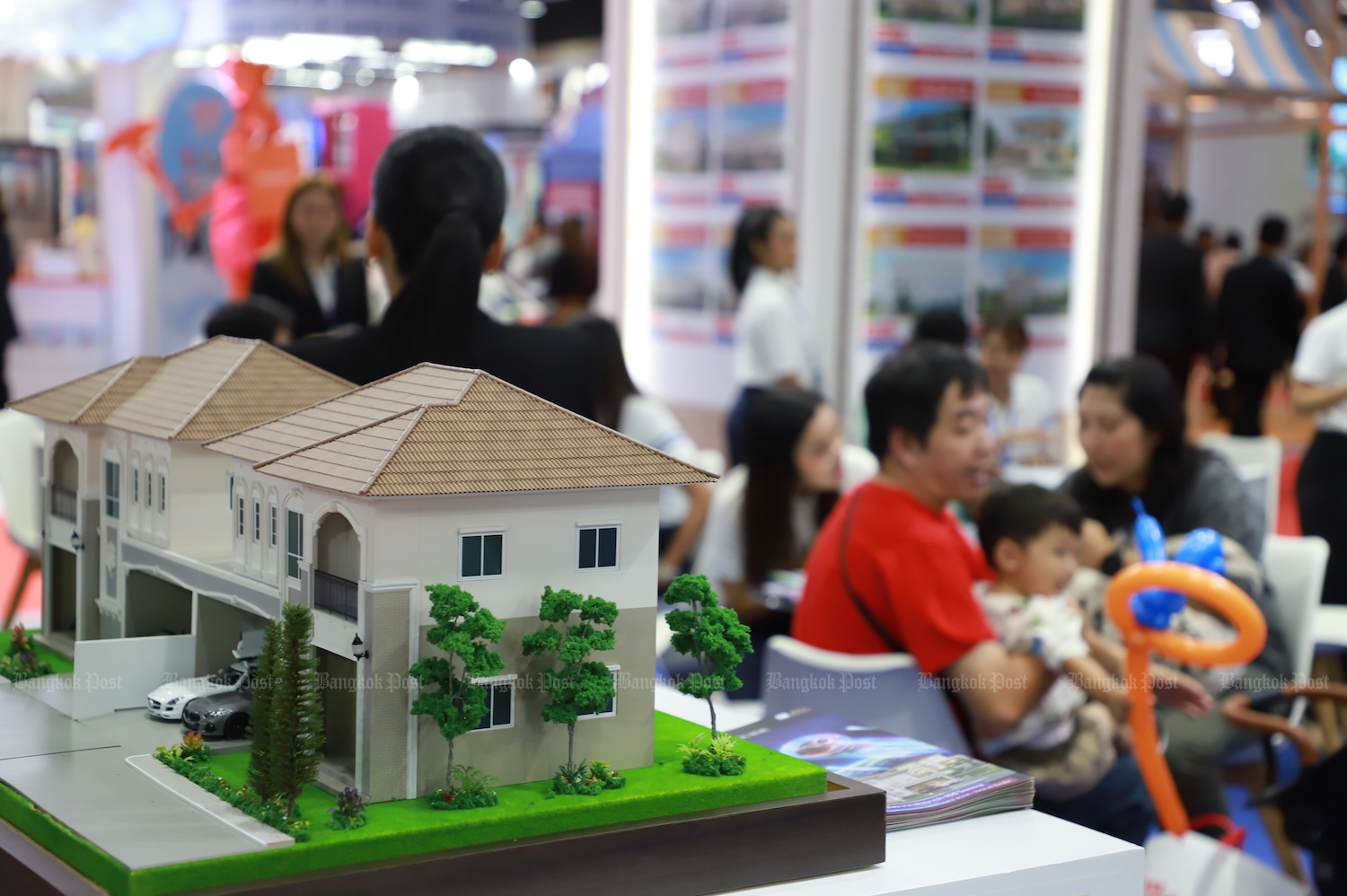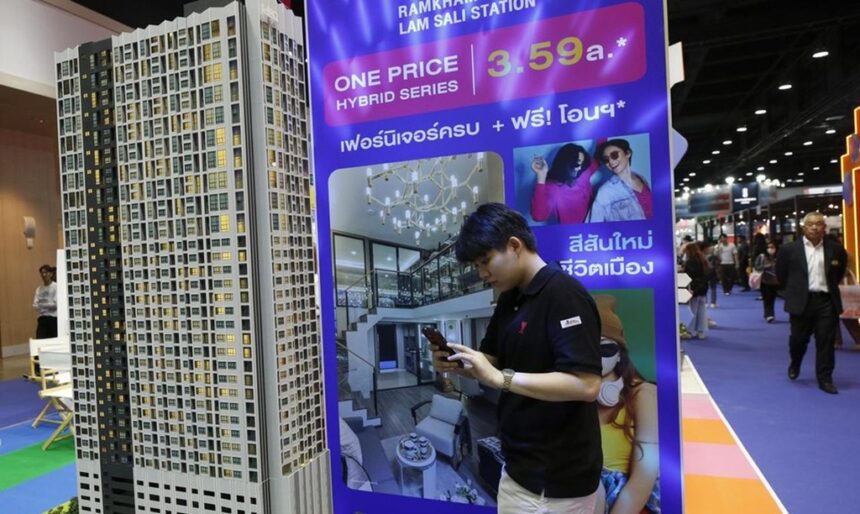BANGKOK – The Thai residential property market, especially in Greater Bangkok, faces a tough year in 2025. Supalai, a prominent property developer listed on the SET, has highlighted tariffs introduced by U.S. President Donald Trump as a key challenge disrupting their operations.
These tariffs have triggered a wave of cancellations and lost deposits from Chinese business owners involved in exports. Tritecha Tangmatitham, managing director of Supalai, says he expects the Greater Bangkok housing market to drop to its lowest point in 15 years.
While the U.S. tariffs have had an impact, deeper issues like Thailand’s slow economic growth, high household debt, and strict mortgage rules are also weighing down the sector.
He said Supalai has reported a sharp increase in cancelled home sales, particularly from Chinese buyers linked to export businesses. Many of these buyers have chosen to pull out of property deals, sometimes losing significant down payments.
The new tariffs, announced on 2 April 2025, set a 37% duty on Thai exports to the U.S., much higher than the 11% many expected. This has hit export-heavy sectors hard.
Chinese buyers have played a major role in Thailand’s property market, especially in cities like Bangkok, Phuket, and Pattaya. According to data from the first half of 2024, Chinese nationals accounted for 39.5% of all foreign condominium transfers, representing nearly 2,900 units at an average price of 4.6 million baht each.
Many of these buyers rely on export income from the U.S., and the new tariffs have created cash flow worries. Facing uncertainty, some have walked away from deals despite losing their deposits.
Tritecha told the Bangkok Post that he expects 2025 to bring the lowest number of new residential project launches in Bangkok since 2009. “The tariffs from the U.S. have made it difficult for our Chinese customers,” he shared.
“We’re seeing more buyers back out, which is affecting our sales goals.” Supalai plans to launch 36 new projects worth 46 billion baht in 2025, down from 52 billion baht the previous year. The falloff in Chinese buyers is hitting the condo market hardest, where they have been a key group.

Greater Bangkok’s Property Market Slows
The outlook for residential real estate in Greater Bangkok continues to dim. New housing supply is set to fall by 0.7% in 2025 to around 61,450 units, a significant drop from the 102,000 units launched in 2023. Unsold housing stock is expected to climb above 230,000 units by the end of 2024, up from the previous year, adding to concerns about oversupply.
Throughout 2024, the market stayed flat. Transfers of new homes dropped 10%, and the total value fell by 9%, based on figures from SCB EIC, the research division of Siam Commercial Bank. The downward trend is likely to continue, with a further 1-3% slide in new unit transfers forecast for 2025. While Supalai has pointed to U.S. tariffs as a key reason for the slowdown, domestic problems play a larger part, and foreign trade policies are only part of the picture.
Thailand’s broader economy is struggling. The National Economic and Social Development Council revised its 2025 GDP growth forecast down to 1.8% from 2.8%. The country saw 3.1% growth year-on-year in the first quarter of 2025, but warnings of a weaker second quarter have led to calls for people to spend less.
Household debt remains high, reaching 88.4% of GDP by the end of 2024. While this is down from a peak of 95.5% in 2021, it’s still among the highest levels in the region. A 2024 Chulalongkorn University study that includes informal loans estimates the real figure at 104% of GDP.
This heavy debt load limits the buying power of many Thais, especially those on middle or lower incomes. Kessara Thanyalakpark, managing director at Sena Development, said, “Economic worries and growing household debt make it harder for people to buy homes.”
Many people are hesitant to take on new mortgages when they’re already struggling with existing debts. The Bank of Thailand has tried to help by relaxing loan-to-value rules and cutting transfer and mortgage fees on homes valued up to 7 million baht, but these steps have had limited effect.

Tougher Mortgage Standards
Another hurdle is the stricter mortgage approval process. In early 2025, banks rejected over half of all mortgage applications, up from 40% at the end of 2024. For homes priced under 3 million baht, the rejection rate hit 70% in 2024 and could rise further. Banks have become stricter, sometimes excluding overtime earnings from income checks, given the uncertainty in the market.
These tougher standards are a response to rising household debt and broader economic worries, not just U.S. tariffs. Stricter lending started before the new tariffs were announced.
Major banks, including Bangkok Bank and Bank of Ayudhya, reported their mortgage portfolios shrank in 2024, falling by 1.7% and 7.6% from the start of the year. Only Krungthai Bank saw an increase, with a 2.9% gain.
These numbers show that challenges in the property market stem from ongoing issues in the local financial system, rather than just external trade pressures.
Despite these challenges, Supalai remains confident about staying strong. Tritecha pointed out the company’s solid finances, with a debt-to-equity ratio of 0.85 and a net profit of 4.2 billion baht in the first nine months of 2024. The firm is using the current lull to boost its share of the market and plans to spend 8 billion baht on land in 30 provinces, adding new spots like Lop Buri, Suphan Buri, and Koh Samui.
Supalai is now targeting higher-income buyers who are less exposed to economic shocks. In 2024, the company rolled out Supalai Prima Villa Thanon Utthayan, a luxury housing project with homes priced from 17.9 to 35 million baht.
This move follows an industry trend, as other developers like Sansiri and Ananda Development have also shifted their focus to high-end projects to balance slower sales in the mass market.
While tariffs from the U.S. have unsettled many Chinese buyers and created hurdles for developers like Supalai, the bigger struggles in Thailand’s housing market come from local economic weakness, high debt, and tighter lending. Supalai’s ability to adjust to these changes and focus on more stable market segments will be key in the months ahead. For now, Greater Bangkok faces one of its toughest property markets in over a decade.














